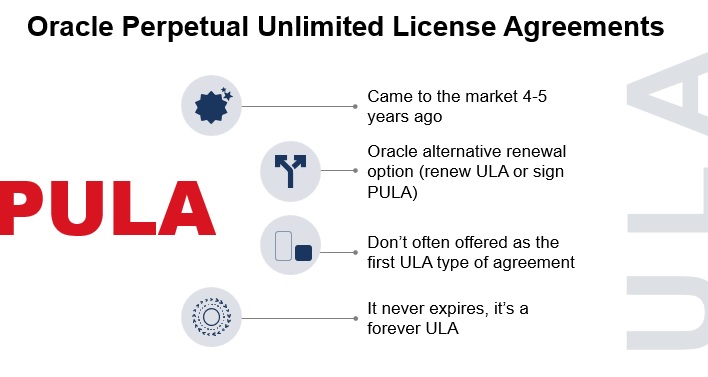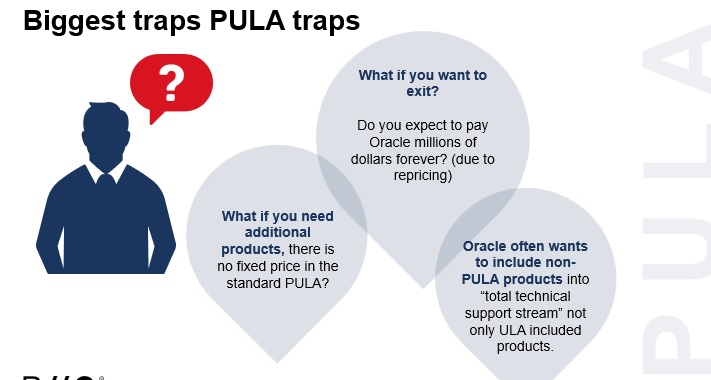
Oracle PULA – Short Answer
An Oracle PULA – Oracle Perpetual Unlimited License Agreement is Oracle ULA agreement but in a version that does not have an end date. It was released in 2015. The main difference from an normal ULA is that it does not expire and it has a higher price.
Oracle PULA can contain all Oracle products, including database, middleware and application products.
Oracle PULA – Long answer
An Oracle Perpetual Unlimited License (PULA) is a type of software license agreement offered by Oracle Corporation for its enterprise software products. Under a PULA agreement, an organization can purchase a perpetual license to use Oracle software indefinitely, with no expiration date or limitations on the number of users or server deployments.
One of the main benefits of a PULA agreement is the ability to use the software indefinitely, without the need to renew or upgrade the license on a regular basis. This can provide long-term cost savings and stability for organizations that rely on Oracle software to support their operations.
Another benefit of a PULA agreement is the ability to use the software on an unlimited number of servers and with an unlimited number of users. This can be particularly useful for organizations with large or rapidly growing IT environments, as it allows them to scale their use of Oracle software without worrying about exceeding license limits. Customers who rely heavily on VMware in combination with Oracle is often a likely customer.
However, there are also some potential downsides to a PULA agreement. One of the main drawbacks is the upfront cost, as PULA licenses tend to be more expensive than the normal ULA agreement. This can be a significant financial burden for organizations with limited budgets or IT resources.
PULA Risks
There are several potential risks associated with an Oracle Unlimited License Agreement (PULA), including:
- Upfront cost: ULAs tend to be more expensive than other types of software licenses, requiring a significant upfront investment. This can be a financial burden for organizations with limited budgets or IT resources.
- License Compliance: Oracle PULA is only limited to fixed sets of products, most organizations mistakenly or unknowinly use non PULA products and have license compliance issues. It is recommended you use an Oracle license expert firm to help you measure and manage this.
- Changes in your company structure: Oracle PULA are highly restrictive when it comes to merger and aquisitions and which legal entities can use the PULA software. If your company is active in this space, you need to negotiate with Oracle flexibility. However Oracle is reluctant to provide flexibility for merger and aquisitions scenarios.
- Complexity of the agreement: ULAs can be complex agreements that require careful review and understanding. There may be various terms and conditions that must be met in order to maintain compliance with the agreement, which can be difficult for organizations to manage.

Overall, it is important for organizations to carefully consider the potential risks and benefits of an Oracle PULA before entering into such an agreement. It is also essential to seek the advice of experienced legal counsel and IT professionals to ensure that the PULA is appropriate for your organization’s needs and budget.
Finally, there is also the risk that an organization’s needs or IT environment may change over time, making a PULA agreement less suitable or cost-effective. For example, an organization may decide to switch to a different software platform or may experience significant changes in the size or complexity of its IT environment.
In these cases, a PULAagreement may not be the most flexible or cost-effective option. With Oracle PULA even if you reduce your Oracle software dependancy with 70% you will still pay the same amount to Oracle in support fees. This is because the support fees you paid initially to Oracle for the PULA will never be reduced. You will need to terminate 95% + of all your licenses to see any savings.
Oracle PULA – Negotiation
There are several steps that organizations can take to negotiate an Oracle Perpetual Unlimited License Agreement (PULA) effectively:
- Understand your needs and requirements: It is important to carefully assess your organization’s needs and requirements for using Oracle software, including the number of users, the number of servers, and any specific customization or integration requirements. This will help you determine the scope and terms of the PULA that are most appropriate for your organization.
- Research and compare different options: There are various types of Oracle software licenses available, including perpetual, subscription, and term licenses. It is important to research and compare the different options to determine which one is the most suitable and cost-effective for your organization.
- Consult with legal and IT professionals: It is advisable to seek the advice of experienced legal counsel and IT professionals when negotiating an Oracle PULA. They can help you understand the terms and conditions of the agreement and ensure that it is appropriate for your organization’s needs and budget.
- Negotiate the terms and conditions: Once you have a clear understanding of your needs and requirements and have identified the most suitable Oracle software license option, you can begin negotiating the terms and conditions of the PULA with Oracle or a reseller. This may include discussing the price, the duration of the agreement, and any additional services or support that are included.
- Review and negotiate any additional terms: It is important to carefully review and negotiate any additional terms or provisions of the PULA, such as those related to maintenance, support, and upgrade policies. This will help ensure that the agreement meets your organization’s needs and protects your interests.
- Get the agreement in writing before accepting: It is essential to have the ULA agreement in writing, as this will provide a clear record of the terms and conditions of the agreement and protect your organization’s interests.
Overall, negotiating an Oracle ULA requires careful planning, research, and negotiation to ensure that it meets the needs and budget of your organization. By following these steps and seeking the advice of experienced professionals, you can negotiate a PULA that provides long-term value and stability for your organization.
Oracle PULA – Managing License Compliance
Managing Oracle license compliance in an Oracle Perpetual Unlimited License Agreement (PULA) requires careful planning and monitoring to ensure that your organization is using the software in accordance with the terms of the agreement. Here are some steps you can take to manage Oracle license compliance in an PULA:
- Understand the terms and conditions of the ULA: It is essential to carefully review and understand the terms and conditions of the ULA, including any limitations or restrictions on the use of the software. This will help you ensure that your organization is using the software in compliance with the agreement.
- Keep track of your software usage: It is important to track and monitor your organization’s use of Oracle software in order to ensure compliance with the PULA. This may include keeping records of the number of users, servers, and other resources that are using the software, as well as any customization or integration efforts.
- Implement internal controls and policies: To help ensure compliance with the PULA, it is advisable to implement internal controls and policies to govern the use of Oracle software. This may include setting up user accounts and permissions, establishing guidelines for the use of the software, and training employees on proper usage.
- Regularly review and update the PULA: To ensure that the PULA remains appropriate for your organization’s needs and budget, it is important to review and update the agreement on a regular basis. This may include negotiating new terms or provisions.
- Seek the advice of legal and IT professionals: If you have any questions or concerns about your organization’s compliance with the PULA, it is advisable to seek the advice of experienced legal and IT professionals. They can provide guidance on how to ensure compliance and address any potential issues.
Overall, managing Oracle license compliance in an PULA requires careful planning, monitoring, and attention to detail. By following these steps and seeking the advice of professionals as needed, you can help ensure that your organization is using Oracle software in compliance with the terms of the PULA.
Oracle ULA vs PULA
Oracle Unlimited License Agreements (ULAs) and Oracle Perpetual Unlimited License Agreements (PULAs) are both types of software license agreements offered by Oracle Corporation for its enterprise software products. However, there are several key differences between ULAs and PULAs:
- Duration: ULAs have a fixed duration, typically ranging from one to five years, while PULAs are perpetual licenses with no expiration date.
- Pricing: ULAs are typically more expensive than PULAs, due to the inclusion of upgrade and update rights. However, PULAs may require a larger upfront investment due to their perpetual nature.
- Flexibility: ULAs may offer more flexibility as a ULA is renewed every 1-5 years and it gives IT procurement the possibility of re-negotiating the terms, removing or adding products. There is no such natural negotiation with an Oracle PULA.
If your organization have an Oracle PULA or are considering one, we can help you. We are experts at Oracle licensing and Oracle PULA licensing agreements.